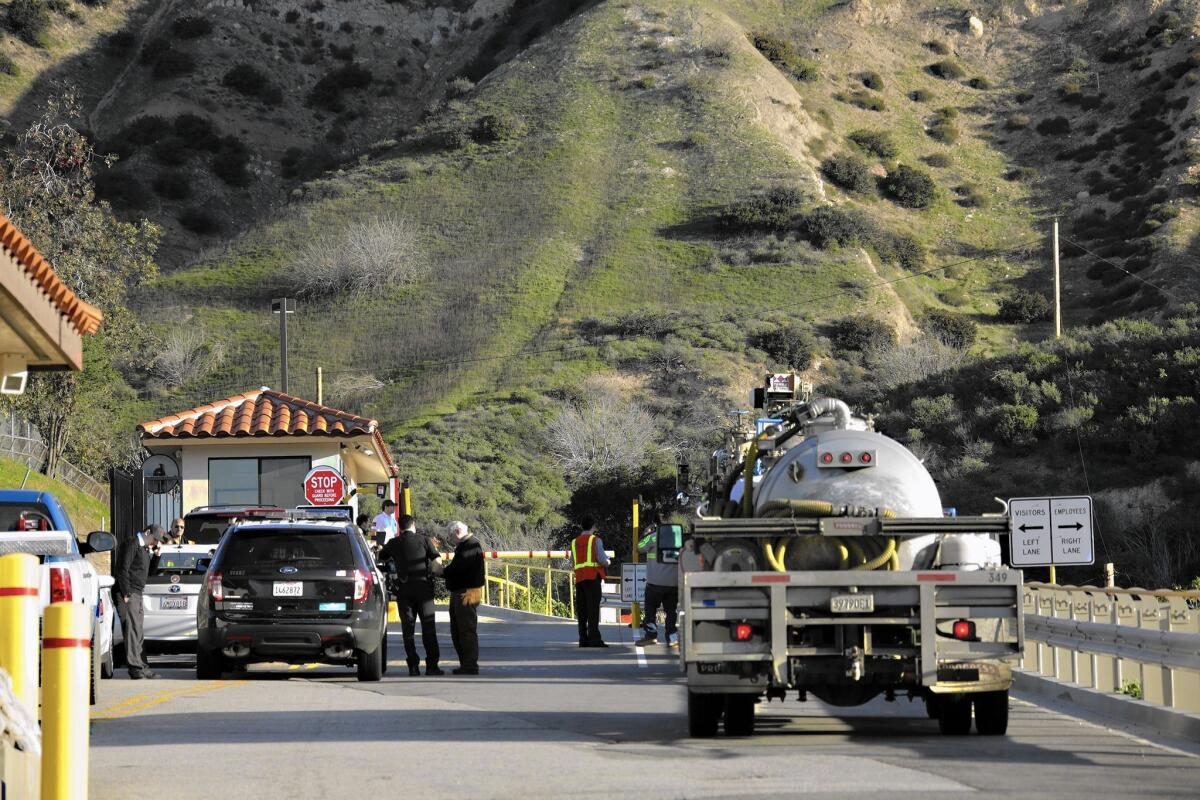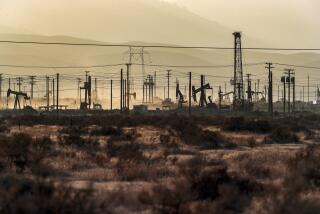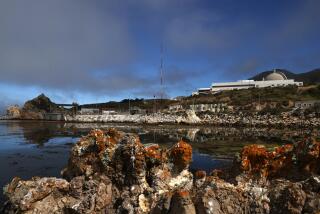Southern California Gas Co. opposes legislation to require new tests of all Aliso Canyon wells

Southern California Gas Co.’s Aliso Canyon facility.
Southern California Gas Co. is pressing to defeat state legislation to require new testing of all wells at its closed Aliso Canyon gas storage field before operations can restart at the field.
The gas company has argued for months that it could restart operations without testing all 115 active injection wells. A bill pending in the state Assembly would require those tests and other steps before operations are restarted.
Public files show the company told regulators in December that 73 wells were “safe” to resume gas injections into the underground reservoir. The statement came two months before the utility plugged a methane leak that had set back state efforts to reduce greenhouse gases and forced about 5,300 households in the Porter Ranch area to relocate.
There was no mention in the files how the company determined those wells were “safe.”
The list included nine wells drilled in 1945 or earlier, including three that have records of underground leak repairs.
In January, the gas company sought a permit for major reworking of one of those wells. In February, it sought a permit to rework a second of those “safe” wells.
Four other wells in Aliso Canyon have also required major work since October. Permits show those include a newer well, drilled in 1978, even though the primary focus by the company and regulators has been on the condition of much older wells. Gas company records show that a test on that well in September found temperature changes sometimes indicative of a leak.
In an interview earlier this week, company executives were unsure of what work was being done on the seven wells. California requires permits only for permanent changes to a well’s outer structure, suggesting the work is major.
State oil and gas regulators ordered the utility in December to stop injections because of the massive leak, which began in October. Gov. Jerry Brown repeated the dictate in an executive order in January.
On Wednesday, the state Division of Oil Gas & Geothermal Resources released recommendations it received from experts calling for extensive testing of all wells before operations resume. The agency has not yet acted on the recommendations and gas company executives this week said they were not certain if they would challenge such rules.
The pending legislation, authored by Sen. Fran Pavley (D-Agoura Hills), also would require extensive testing but it would go further, making the process public and requiring agreement by multiple regulatory agencies before operations are allowed to resume.
Pavley said concurrence by other agencies is vital. Residents “should ask themselves whether they believe regulations from the Division of Oil Gas & Geothermal Resources or a statute would provide the most certainty.”
Her concern “is that once the leak is stopped, we would quickly go back to business as usual,” Pavley said.
Southern California Gas said it has taken no “formal” position on the bill.
“I’ll tell you we will be supportive of any new regulation that comes out from the legislative side or it comes out from the regulatory side,” Chief Executive Dennis Arriola said in an interview Thursday.
However, records and interviews show the company has actively recruited others to oppose the bill, which has been approved by the Senate and faces a critical hearing in the Assembly on Monday.
Those surrogates argue that if Aliso Canyon is not put back into use soon, the utility will be unable to provide sufficient natural gas this summer to gas-fired electric power plants.
They also say the inability to buy and inject gas when it is cheapest during the summer may mean price hikes next winter.
Their arguments include warnings of brownouts.
“Seniors need to be able to cook and heat their homes now and face the summer knowing they will have a dependable supply of electricity...” said a letter opposing the bill filed by Congress of California Seniors President Hank Lacayo.
Phone calls to the seniors organization were not returned. Annual reports show Southern California Gas’ parent Sempra Energy is a financial backer of the Sacramento-based organization and the gas company is a major sponsor of a business institute named after Lacayo.
His letter followed a form-letter template circulated by Southern California Gas, as did others lodged in opposition to Pavley’s bill.
Brad Jensen, public policy director for the San Gabriel Valley Economic Partnership, a business development agency, said that without Aliso Canyon’s fields in use, “I don’t think there is enough storage capacity” for the gas company to fuel power plants during peak demand periods.
Jensen said he was asked by the gas company to oppose Pavley’s bill. The utility has a representative on the development agency’s board of directors.
Though the state Public Utilities Commission and other agencies raised concern about such shortages last month, no official reports say Southern California Gas cannot meet energy demands in the Los Angeles Basin without Aliso Canyon.
The U.S. Energy Information Administration is doing that research, staff at the federal agency said, but a draft report is not available.
Monthly reports on underground gas storage in California collected by the federal energy administration show the gas company has more storage capacity beyond what it uses to supply core customers.
The utility sells a third of its storage space in Aliso Canyon and three smaller fields to “non-core” customers, including market traders, according to documents made public.
The amount of gas stored in Aliso Canyon that had been sold to that secondary market was blacked out.
Times staff writer Alice Walton contributed to this report.
ALSO
Apartment teetering on the edge of a ocean cliff is demolished
‘Coronageddon’ has begun: 91 Freeway closed in Corona for 55 hours
California couple pleads guilty to smuggling 911 sea turtle eggs from Mexico
More to Read
Inside the business of entertainment
The Wide Shot brings you news, analysis and insights on everything from streaming wars to production — and what it all means for the future.
You may occasionally receive promotional content from the Los Angeles Times.











